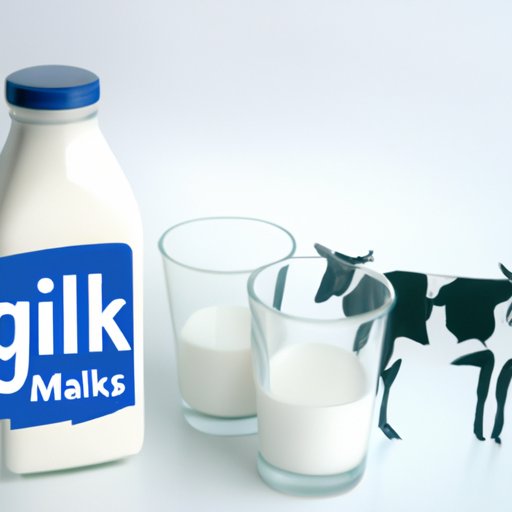
Introduction
For those who are lactose intolerant, consuming dairy products can be difficult. Lactose intolerance is a common condition that occurs when the body is unable to fully digest lactose, a sugar found in milk and other dairy products. While traditional dairy products may be off-limits for lactose intolerant individuals, goat’s milk has become a popular alternative. In this article, we will explore whether or not goat’s milk is lactose-free and if it can be a good alternative for those with lactose intolerance.
What is Lactose Intolerance?
Lactose intolerance is a digestive disorder where people are unable to digest lactose completely. This condition is caused by a lack of lactase, the enzyme responsible for breaking down lactose in the body. When lactose isn’t fully absorbed, it can cause symptoms such as gas, bloating, diarrhea, abdominal pain, and nausea.
Lactose intolerance can vary in severity, with some people experiencing mild symptoms while others may have more severe reactions. While lactose intolerance is not life-threatening, it can affect an individual’s quality of life and diet.
Is Goat’s Milk a Good Alternative for People with Lactose Intolerance?
Many people who are lactose intolerant have turned to goat’s milk as a source of dairy. Goat’s milk has less lactose than cow’s milk, making it easier on the digestive system. In fact, many individuals with lactose intolerance can tolerate goat’s milk without any issues.
Goat’s milk has a unique composition that allows it to be digested more easily than cow’s milk. For example, the fat globules in goat’s milk are smaller than those in cow’s milk, making them easier to digest. Additionally, goat’s milk has a higher concentration of short and medium-chain fatty acids, which are broken down more quickly and easily in the digestive system.
While goat’s milk is not lactose-free, its lower lactose content makes it a better option for those with lactose intolerance. Research studies have found that consuming goat’s milk products can cause less bloating, gas, and indigestion than cow’s milk products. Goat’s milk products are also believed to have anti-inflammatory properties, which may benefit individuals with digestive issues.
The Science Behind Goat’s Milk
Compared to cow’s milk, goat’s milk has less lactose. In fact, goat’s milk contains about 12 grams of lactose per cup, while cow’s milk contains about 17 grams of lactose per cup.
Goat’s milk also contains a different kind of casein protein than cow’s milk. This protein is easier for some people to digest and can also be broken down more easily in the digestive system.
Goat’s milk is also rich in beneficial nutrients, including protein, calcium, and potassium. In fact, goat’s milk has more protein than cow’s milk. It is also a good source of phosphorus, magnesium, and vitamin B2.
Comparing Goat’s Milk to Other Lactose Alternatives
There are many lactose alternatives available for individuals who are lactose intolerant. Some of the most popular options include almond milk, soy milk, and lactose-free milk.
Almond milk is a good option for those who are lactose intolerant and also have nut allergies. It’s low in calories, but also low in protein and has little calcium compared to dairy milk.
Soy milk contains a similar amount of protein to dairy milk and is high in phytochemicals, but some individuals may be allergic to soy products.
Lactose-free milk is cow’s milk that has been treated to remove lactose. While lactose-free milk is a good option for those who have a lactose intolerance, it still contains dairy. As a result, individuals with other dairy allergies may not be able to tolerate it.
When compared to these options, goat’s milk comes out on top in terms of taste, nutrition, and compatibility with lactose intolerant individuals.
Making Dairy Products with Goat’s Milk
Goat’s milk is an excellent choice for making dairy products such as cheese and yogurt. Goat’s milk cheese and yogurt are often creamier than their cow’s milk counterparts, and also have a slightly tangy flavor.
To make yogurt with goat’s milk, you will need to start by heating up the milk to about 180 degrees Fahrenheit. Next, let the milk cool down until it reaches 115 degrees Fahrenheit and then add yogurt culture. Finally, incubate the mixture for several hours until the yogurt becomes thick.
To make goat’s milk cheese, start by heating up the milk to around 86 degrees Fahrenheit and adding rennet. Next, stir the mixture and let it cool down. After the mixture has cooled, strain it through cheesecloth and allow it to drip for several hours.
Real People, Real Experiences
Many individuals who are lactose intolerant have positive things to say about goat’s milk as an alternative dairy product. Some individuals report less bloating, gas, and digestive issues when consuming goat’s milk products. Others appreciate the taste and creamy texture of goat’s milk products.
One lactose intolerant individual named Sarah said, “I switched to goat’s milk products a few months ago, and I’ve noticed a significant difference in my digestion. I no longer experience the bloating and gas that I used to after consuming cow’s milk products.”
Conclusion
Although goat’s milk is not lactose-free, it is a fantastic alternative for individuals who are lactose intolerant. Goat’s milk is easier on the digestive system than cow’s milk and is a great source of nutrition. Individuals who enjoy dairy products but experience digestive issues due to lactose intolerance should consider trying goat’s milk as an alternative.




